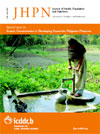
|
The Journal of Health, Population and Nutrition
icddr,b
ISSN: 1606-0997
EISSN: 1606-0997
Vol. 33, No. 2, 2015, pp. 1-5
|
 Bioline Code: hn15025
Bioline Code: hn15025
Full paper language: English
Document type: Report
Document available free of charge
|
|
|
The Journal of Health, Population and Nutrition, Vol. 33, No. 2, 2015, pp. 1-5
| en |
An outbreak of cholera in Medipally village, Andhra Pradesh, India, 2013
Uthappa, Chengappa K.; Allam, Ramesh R.; Nalini, Chava; Gunti, Deepak; Udaragudi, Prasada R.; Tadi, Geetha P. & Murhekar, Manoj V.
Abstract
Background: Cholera continues to remain endemic in over 50 countries and has caused large epidemics with around
3–5 million cases occurring every year in Asia alone. In India, cholera is endemic in many states. However, etiological
information and age-specific incidence related to cholera outbreaks is limited. In November 2013, district authorities
reported a cluster of diarrheal disease among residents of Medipally to the state surveillance unit. We investigated this
cluster to confirm its etiology, describe its magnitude, identify potential risk factors, and make recommendations for
control.
Findings: A house-to-house active search was conducted to identify cases of acute diarrhea and collect information on
drinking water source. Drinking water samples were collected from common water sources and sampled households to
test for bacteriological quality. Ten stool samples were collected for culture. A matched case–control study was
conducted to identify the risk factors. A total of 138 case-patients of diarrhea (Attack rate: 11.5/100; Population: 15 1,200)
and 1 death (Case Fatality Ratio: 0.72/100) were identified. Five of the 10 stool samples were culture positive for V.
cholerae, serogroup O1 El Tor. Drinking water from the overhead tank [Adjusted OR (AOR): 31.94, 95 % CI: 7.3-139.5] was
associated with risk of developing illness.
Conclusions: This outbreak affected nearly 11% of the village population and was due to contamination of the main
drinking water source. Outbreaks such as this can be prevented by constructing the drain away from the water pipelines
and by monitoring regular chlorination of drinking water source and inspection of pipelines for damage.
|
| |
© Copyright 2015 - The Journal of Health, Population and Nutrition
Alternative site location: http://www.jhpn.net
|
|
